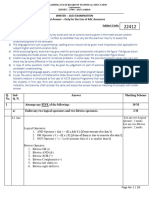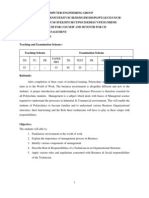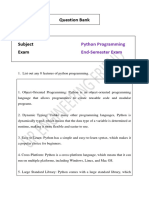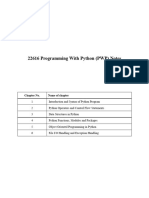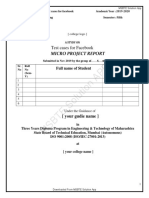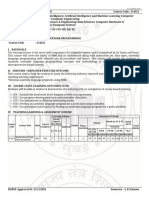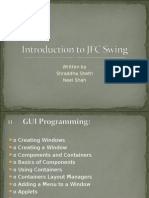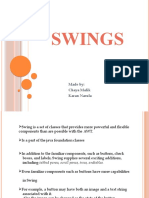Java Programming
Uploaded by
khaparderahilJava Programming
Uploaded by
khaparderahilJAVA PROGRAMMING Course Code : 314306
: Artificial Intelligence/ Artificial Intelligence and Machine Learning/ Cloud Computing
and Big Data/ Computer Technology/
Computer Engineering/ Computer Science & Engineering/ Data Sciences/ Computer
Programme Name/s
Hardware & Maintenance/
Information Technology/ Computer Science & Information Technology/ Electronics &
Computer Engg.
Programme Code : AI/ AN/ BD/ CM/ CO/ CW/ DS/ HA/ IF/ IH/ TE
Semester : Fourth
Course Title : JAVA PROGRAMMING
Course Code : 314306
I. RATIONALE
Java is platform independent, open-source object-oriented programming language and used for web applications.
Java has the broad industry support and is prerequisite with many allied technologies like Java Server Pages,
Android Application Development. This course will enable students to develop applications using java.
II. INDUSTRY / EMPLOYER EXPECTED OUTCOME
Develop standalone and network-based applications using Java.
III. COURSE LEVEL LEARNING OUTCOMES (COS)
Students will be able to achieve & demonstrate the following COs on completion of course based learning
CO1 - Develop java program using classes and objects.
CO2 - Develop java program for implementing code reusability concept.
CO3 - Develop program to implement multithreading and exception handling.
CO4 - Develop java program for implementing event handling using window-based application components.
CO5 - Implements network programming in java.
CO6 - Develop java program for managing database.
IV. TEACHING-LEARNING & ASSESSMENT SCHEME
Learning Scheme Assessment Scheme
Actual
Based on LL &
Contact Based on
Theory TL
Course Course Hrs./Week SL
Course Title Abbr Credits Paper Total
Code Category/s SLH NLH Practical
Duration Marks
FA- SA-
CL TL LL Total FA-PR SA-PR SLA
TH TH
Max Max Max Min Max Min Max Min Max Min
JAVA
314306 JPR AEC 4 1 4 1 10 5 3 30 70 100 40 25 10 50# 20 25 10 200
PROGRAMMING
MSBTE Approval Dt. Semester - 4, K Scheme
JAVA PROGRAMMING Course Code : 314306
Total IKS Hrs for Sem. : 0 Hrs
Abbreviations: CL- ClassRoom Learning , TL- Tutorial Learning, LL-Laboratory Learning, SLH-Self Learning
Hours, NLH-Notional Learning Hours, FA - Formative Assessment, SA -Summative assessment, IKS - Indian
Knowledge System, SLA - Self Learning Assessment
Legends: @ Internal Assessment, # External Assessment, *# On Line Examination , @$ Internal Online
Examination
Note :
1. FA-TH represents average of two class tests of 30 marks each conducted during the semester.
2. If candidate is not securing minimum passing marks in FA-PR of any course then the candidate shall be
declared as "Detained" in that semester.
3. If candidate is not securing minimum passing marks in SLA of any course then the candidate shall be declared
as fail and will have to repeat and resubmit SLA work.
4. Notional Learning hours for the semester are (CL+LL+TL+SL)hrs.* 15 Weeks
5. 1 credit is equivalent to 30 Notional hrs.
6. * Self learning hours shall not be reflected in the Time Table.
7. * Self learning includes micro project / assignment / other activities.
V. THEORY LEARNING OUTCOMES AND ALIGNED COURSE CONTENT
Suggested
Theory Learning Outcomes Learning content mapped with Theory Learning
Sr.No Learning
(TLO's)aligned to CO's. Outcomes (TLO's) and CO's.
Pedagogies.
Unit - I Basic Syntactical Constructs in Java
TLO 1.1 Write programs to
1.1 Java features and the Java programming
create classes and objects for the
environment
given problem.
1.2 Defining a class, creating object, accessing class
TLO 1.2 Describe characteristics
members
of the given java token.
1.3 Java tokens and data types, symbolic constant,
TLO 1.3 Write program to Chalk-Board
scope of variable, typecasting, and different types of
evaluate given expressions. Demonstration
operators and expressions, decision making and
1 TLO 1.4 Write programs using Flipped
looping statements
relevant control structure to solve Classroom
1.4 Arrays, strings, string buffer classes, vectors,
the given problem. Presentations
wrapper classes
TLO 1.5 Develop programs
1.5 Constructors and methods, types of constructors,
using vectors and wrapper
method and constructor overloading, nesting of
classes for the given problem.
methods, command line arguments, garbage
TLO 1.6 Use constructors for the
collection, visibility control: public, private,
given programming problem.
protected, default, private protected
Unit - II Inheritance, Interface and Packages
2.1 Inheritance: concept of inheritance , types of
TLO 2.1 Apply identified type of
Inheritance: single inheritance, multilevel
inheritance for the given
inheritance, hierarchical inheritance, method
programming problem. Lecture Using
overriding, final variables, final methods, use of
TLO 2.2 Differentiate between Chalk-Board
super, abstract methods and classes
overloading and overriding with Presentations
2 2.2 Interfaces: Define interface, implementing
the help of examples. Hands-on
interface, accessing interface variables and methods,
TLO 2.3 Develop program using Flipped
extending interfaces
interface. Classroom
2.3 Package: Define package, types of package,
TLO 2.4 Create user defined
naming and creating package, accessing package,
package for the given problem.
import statement, static import, adding class and
interfaces to a package
MSBTE Approval Dt. Semester - 4, K Scheme
JAVA PROGRAMMING Course Code : 314306
Suggested
Theory Learning Outcomes Learning content mapped with Theory Learning
Sr.No Learning
(TLO's)aligned to CO's. Outcomes (TLO's) and CO's.
Pedagogies.
Unit - III Exception Handling and Multithreading
TLO 3.1 Distinguish the errors
3.1 Errors and Exception: Types of errors and
and exceptions with example.
exceptions, try and catch statement, throws and Lecture Using
TLO 3.2 Develop program for
finally statement, built-in exceptions, throwing our Chalk-Board
handling the given exception.
own exception Presentations
3 TLO 3.3 Crate threads to run
3.2 Multithreaded programming : creating a thread: Flipped
multiple processes in a program.
By extending to thread class and by implementing Classroom
TLO 3.4 Develop program using
runnable Interface, Life cycle of thread: Thread Hands-on
different thread life cycle
methods, thread exceptions, thread priority and
methods.
methods, synchronization
Unit - IV Event handling using Abstract Window
Toolkit (AWT) & Swings Components
TLO 4.1 Write steps to develop 4.1 Component, container, window, frame, panel, use
Graphical User Interface (GUI) of AWT controls: labels, buttons, checkbox,
using AWT components with checkbox group, textfield, textarea
frame for the given problem. 4.2 Use of layout managers: flowLayout,
TLO 4.2 Develop program using borderLayout, gridLayout, gridBagLayout,
menu and dialog boxes for the menubars, menus, file dialog
given problem. 4.3 Introduction to swing: Swing features, difference
Lecture Using
TLO 4.3 Write steps to develop between AWT and Swing.
Chalk-Board
Graphical user interface (GUI) 4.4 Swing components: Icons and Labels, TextField,
4 Presentations
using advanced swing ComboBox, Button, Checkbox, RadioButton
Demonstration
components for the given 4.5 Advanced Swing Components: Tabbed Panes,
Hands-on
problem. Scroll Panes, Trees, Tables, Progress bar, tool tips
TLO 4.4 Use delegation event 4.6 Introduction to Event Handling: The delegation
model to develop event driven Event Model: Event sources, Event listeners
program for the given problem. 4.7 Event classes: The action event class, the Item
TLO 4.5 Use relevant AWT/ event class, the Key event class, the mouse event
Swing component(s) to handle class, text event
the given event. 4.8 Event listener interfaces: ActionListener ,
ItemListener , KeyListener , MouseListener ,
MouseMotion , TextListener
Unit - V Basics of Network Programming
TLO 5.1 Describe the concepts
5.1 Socket Overview: Client/Server , reserved
of sockets in java. Lecture Using
Sockets , proxy servers , Internet Addressing
TLO 5.2 Use networking classes Chalk-Board
5.2 Java and the Net: The networking classes and
to retrieve host details. Presentations
5 interfaces, InetAddress : Factory Methods , Instance
TLO 5.3 Develop program for Flipped
Methods
Client/Server communication Classroom
5.3 TCP/IP Client and Server Sockets, datagram
through TCP/IP Server sockets Hands-on
sockets, datagram packets
for the given problem.
5.4 The URL Class, URLConnection class
TLO 6.1 Choose relevant
database connectivity methods.
Unit - VI Interacting with Database
TLO 6.2 Describe two tier and Lecture Using
6.1 Introduction to JDBC, ODBC
three tier architecture of JDBC. Chalk-Board
6.2 JDBC architecture: Two tier and three tier models
TLO 6.3 Choose relevant type of Presentations
6 6.3 Types of JDBC drivers, Class Class ,
JDBC driver for the specified Flipped
DriverManager class, Connection interface,
environment. Classroom
Statement interface, PreparedStatement interface,
TLO 6.4 Elaborate steps with Hands-on
ResultSet Interface
example to establish connectivity
with the specified database.
MSBTE Approval Dt. Semester - 4, K Scheme
JAVA PROGRAMMING Course Code : 314306
VI. LABORATORY LEARNING OUTCOME AND ALIGNED PRACTICAL / TUTORIAL EXPERIENCES.
Practical / Tutorial / Laboratory Sr Laboratory Experiment / Practical Titles / Number Relevant
Learning Outcome (LLO) No Tutorial Titles of hrs. COs
* Setup Java Programming development
environment using:
LLO 1.1 Install any IDE software
1 Command prompt.(Classpath and path setup) 2 CO1
application.
Any IDE (Eclipse, Netbeans, VScode, Jcreator
etc.).
LLO 2.1 Implement programs to
Write programs to evaluate different types of
evaluate different types of 2 2 CO1
expressions.
Expressions.
Write programs to demonstrate use of:
LLO 3.1 Develop program to if statements (all forms of if statement
implement different control 3 Switch – Case statement 2 CO1
structures. Different types of Loops(for,while and
do..while).
*Write programs for implementation of different
LLO 4.1 Develop program to methods of:
implement different control 4 2 CO1
String class.
structures.
StringBuffer class.
* Write programs to demonstrate:
LLO 5.1 Implement array and
5 Use of Array. 2 CO1
vectors in Java.
Use of Vectors .
Write programs using Wrapper Class :
LLO 6.1 Convert primitive data
6 to convert primitive into object. 2 CO1
types into object and vice-versa.
to convert object into primitive.
LLO 7.1 Initialize objects using Develop a program for implementation of different
7 2 CO1
constructors. types of constructors.
Develop program to implement:
LLO 8.1 Implement concepts of
8 Single inheritance. 2 CO2
inheritance for code reusability.
Multilevel inheritance.
LLO 9.1 Implement multiple
9 * Develop program for implementation of interface. 2 CO2
inheritance.
*Write programs to demonstrate use of :
LLO 10.1 Implement packages in
10 Built in packages 2 CO2
Java.
User defined packages.
LLO 11.1 Execute different
processes simultaneously using 11 *Write programs using multithreading. 2 CO3
multithreading.
MSBTE Approval Dt. Semester - 4, K Scheme
JAVA PROGRAMMING Course Code : 314306
Practical / Tutorial / Laboratory Sr Laboratory Experiment / Practical Titles / Number Relevant
Learning Outcome (LLO) No Tutorial Titles of hrs. COs
LLO 12.1 Identify the different
Write programs for implementation of try, catch and
types of errors using exception 12 2 CO3
finally block.
handling.
LLO 13.1 Manage different types *Write programs for implementation of throw,
13 2 CO3
of user defined exceptions. throws clause.
LLO 14.1 Design GUI using * Write program to design any type of form using
14 2 CO4
different AWT components. AWT components.
LLO 15.1 Design GUI using Write program to create a menu bar with various
15 2 CO4
different menu class. menu items and sub menu items.
Write program to demonstrate the use of border
LLO 16.1 Design GUI using layout. The layout shows four buttons at four sides
16 2 CO4
border layout manager. with captions “left”, “right”, “top” and “bottom”
using Swing Components.
*Write program to design a calculator to
LLO 17.1 Design GUI using grid
17 demonstrate the use of grid layout using swing 2 CO4
layout manager.
components.
LLO 18.1 Implement swing Write program using swing to display a JComboBox
18 2 CO4
components in a frame. in a JFrame .
LLO 19.1 Design tree and table
using advanced swing components 19 Write program to create JTree and JTable. 2 CO4
in a frame.
LLO 20.1 Implement various keys * Write program to handle key events and mouse
20 2 CO4
and mouse events. events.
LLO 21.1 Implement action event *Write program to implement action event in frame
21 2 CO4
in java. using swing components.
LLO 22.1 Implement text event in Write program to handle text event on swing
22 2 CO4
java. components.
LLO 23.1 Extract the hostname
Write program to retrieve hostname and IP address
and IP address using InetAddress 23 2 CO4
using InetAddress class.
class.
LLO 24.1 Retrieve various *Write program to demonstrate various methods of:
components of URL using
24 URL class. 2 CO5
different methods of URL and
URLConnection.
URLConnection class.
LLO 25.1 Implement client-server *Write program that demonstrates connection
25 2 CO4
TCP based communication. oriented communication using socket.
LLO 26.1 Implement client- Write program to demonstrate sending and receiving
26 2 CO4
server UDP based communication. data through datagram.
*Write program to:
LLO 27.1 Make database
connectivity using appropriate 27 Create sample database. 2 CO5
JDBC driver. Make connectivity with database.
*Write program to implement following operations
on database:
LLO 28.1 Manage database using
28 Insert record. 2 CO5
JDBC.
Update record.
Delete record.
MSBTE Approval Dt. Semester - 4, K Scheme
JAVA PROGRAMMING Course Code : 314306
Practical / Tutorial / Laboratory Sr Laboratory Experiment / Practical Titles / Number Relevant
Learning Outcome (LLO) No Tutorial Titles of hrs. COs
LLO 29.1 Manage database using Write program to demonstrate the use of
29 2 CO5
JDBC. PreparedStatement.
*Write program to retrieve data from table using
LLO 30.1 Implement dynamic
30 ResultSet interface.(Use various methods of 2 CO5
query.
navigation methods).
Note : Out of above suggestive LLOs -
'*' Marked Practicals (LLOs) Are mandatory.
Minimum 80% of above list of lab experiment are to be performed.
Judicial mix of LLOs are to be performed to achieve desired outcomes.
VII. SUGGESTED MICRO PROJECT / ASSIGNMENT/ ACTIVITIES FOR SPECIFIC LEARNING /
SKILLS DEVELOPMENT (SELF LEARNING)
Other
Complete any course of Java Programming on Infosys Springboard/Spoken Tutorial/NPTEL
Develop java code for given problem suggested by course teacher.
Micro project
Develop mini-ATM machine system. It should accept account_no, account_holder_name, account_balance and
perform operations such as withdrawal, Deposit and balance check.
Develop Quiz Management System. Quiz should accept student credentials and contain 10 MCQ type questions.
Determine the final result. Save the result in table along with student credentials.
Energy Billing System: Expected to develop bill amount module based on usage of energy consumption.
Develop Employee Management System. Insert employee details such as employee_name, emp_id,emp_salary
etc.. into database and retrieve data from table.
Any other micro project as suggested by course teacher.
Assignment
Solve assignment covering all COs given by course teacher.
Note :
Above is just a suggestive list of microprojects and assignments; faculty must prepare their own bank of
microprojects, assignments, and activities in a similar way.
The faculty must allocate judicial mix of tasks, considering the weaknesses and / strengths of the student in
acquiring the desired skills.
If a microproject is assigned, it is expected to be completed as a group activity.
SLA marks shall be awarded as per the continuous assessment record.
If the course does not have associated SLA component, above suggestive listings is applicable to Tutorials
and maybe considered for FA-PR evaluations.
VIII. LABORATORY EQUIPMENT / INSTRUMENTS / TOOLS / SOFTWARE REQUIRED
Relevant LLO
Sr.No Equipment Name with Broad Specifications
Number
1 Databases like MySQL, Oracle, MS-Access or any other. 27,28,29,30
2 Computer System (Any computer system with basic configuration). All
MSBTE Approval Dt. Semester - 4, K Scheme
JAVA PROGRAMMING Course Code : 314306
Relevant LLO
Sr.No Equipment Name with Broad Specifications
Number
Computer with JDK1.8 or above, any IDE for Java Programming such as Eclipse,
3 All
Jcreator, NetBeans,VScode .
IX. SUGGESTED WEIGHTAGE TO LEARNING EFFORTS & ASSESSMENT PURPOSE (Specification
Table)
Aligned Learning R- U- A- Total
Sr.No Unit Unit Title
COs Hours Level Level Level Marks
1 I Basic Syntactical Constructs in Java CO1 8 4 4 4 12
2 II Inheritance, Interface and Packages CO2 10 2 4 6 12
3 III Exception Handling and Multithreading CO3 12 2 4 6 12
Event handling using Abstract Window
4 IV CO4 14 4 4 8 16
Toolkit (AWT) & Swings Components
5 V Basics of Network Programming CO5 8 2 4 4 10
6 VI Interacting with Database CO6 8 2 2 4 8
Grand Total 60 16 22 32 70
X. ASSESSMENT METHODOLOGIES/TOOLS
Formative assessment (Assessment for Learning)
Continuous assessment based on process and product related performance indicators.
Each practical will be assessed considering 60% weightage to process 40% weightage to product
A continuous assessment based on term work
Summative Assessment (Assessment of Learning)
End semester examination, Lab performance, Viva voce
XI. SUGGESTED COS - POS MATRIX FORM
Programme
Specific
Programme Outcomes (POs)
Outcomes*
(PSOs)
Course PO-5
Outcomes PO-1 Basic Engineering
PO-3 PO-7
(COs) and PO-2 PO-4 Practices for
Design/ PO-6 Project Life PSO- PSO- PSO-
Discipline Problem Engineering Society,
Development Management Long 1 2 3
Specific Analysis Tools Sustainability
of Solutions Learning
Knowledge and
Environment
CO1 2 2 1 2 -- 1 1
CO2 2 2 2 2 -- 1 1
CO3 2 2 2 2 -- 1 1
CO4 2 2 2 2 1 2 2
CO5 2 2 3 2 1 2 2
CO6 2 2 3 3 1 2 2
Legends :- High:03, Medium:02,Low:01, No Mapping: -
*PSOs are to be formulated at institute level
MSBTE Approval Dt. Semester - 4, K Scheme
JAVA PROGRAMMING Course Code : 314306
XII. SUGGESTED LEARNING MATERIALS / BOOKS
Sr.No Author Title Publisher with ISBN Number
Programming with Mcgraw Hill Education (India) Private Limited, New Delhi .
1 E Balaguruswamy
JAVA ISBN-13: 978-93-5134-320-2
Java Complete
2 Schildt Herbert Mcgraw Hill Education, New Delhi . ISBN:9789339212094
Reference
Holzner, Steven et Java 8 Programming
3 Dreamtech Press, New Delhi. ISBN: 978-93-5119-758-4
al Black Book
XIII . LEARNING WEBSITES & PORTALS
Sr.No Link / Portal Description
1 https://www.javatpoint.com/java-tutorial All content
2 https://www.w3schools.com/java/ All content
3 https://www.tutorialspoint.com/java/index.htm All content
Online compiler for
4 https://www.programiz.com/java-programming/online-compiler/
java
Online compiler for
5 https://onecompiler.com/java
java
https://www.odbms.org/wp-content/uploads/2013/11/009.01-Arlo
6 Database Connectivity
w-JDBC-Tutorial-July-2005.pdf
https://infyspringboard.onwingspan.com/web/en/app/toc/lex_29
7 All content
959473947367270000_shared/overview
https://infyspringboard.onwingspan.com/web/en/app/toc/lex_au
8 All content
th_0138420095549112329730_shared/overview
9 https://onlinecourses.nptel.ac.in/noc22_cs47/preview All content
Note :
Teachers are requested to check the creative common license status/financial implications of the suggested
online educational resources before use by the students
MSBTE Approval Dt. Semester - 4, K Scheme
You might also like
- Object Oriented Programming (OOPs) or C++ Sample Paper of MSBTE For Third Semester Computer Engineering Diploma (80 Marks)90% (10)Object Oriented Programming (OOPs) or C++ Sample Paper of MSBTE For Third Semester Computer Engineering Diploma (80 Marks)3 pages
- Write A Program To Create A Student Table in Database and Insert A Record in Student TableNo ratings yetWrite A Program To Create A Student Table in Database and Insert A Record in Student Table2 pages
- 2019 Summer Model Answer Paper (Msbte Study Resources)No ratings yet2019 Summer Model Answer Paper (Msbte Study Resources)17 pages
- Today's Content: Program Development StepsNo ratings yetToday's Content: Program Development Steps7 pages
- Today's Content: Microprocessor Notes Lecture #1No ratings yetToday's Content: Microprocessor Notes Lecture #115 pages
- 17512-2019-Winter-Model-Answer-Paper (Msbte Study Resources)No ratings yet17512-2019-Winter-Model-Answer-Paper (Msbte Study Resources)36 pages
- 22316-2023-Winter-Question-Paper (Msbte Study Resources)No ratings yet22316-2023-Winter-Question-Paper (Msbte Study Resources)3 pages
- Web Based Application Using PHP (22619) : Mrs Priya Ramesh Rangdal (Zade)100% (1)Web Based Application Using PHP (22619) : Mrs Priya Ramesh Rangdal (Zade)38 pages
- Write A PL/SQL Program To Find A Given Number Is Positive, Negative or ZeroNo ratings yetWrite A PL/SQL Program To Find A Given Number Is Positive, Negative or Zero7 pages
- A Micro-Project Report On "Generate Febonnaci Sequence"100% (1)A Micro-Project Report On "Generate Febonnaci Sequence"10 pages
- 22519-2019-Winter-Model-Answer-Paper (Msbte Study Resources)No ratings yet22519-2019-Winter-Model-Answer-Paper (Msbte Study Resources)30 pages
- Name: Manish Kumhar Class: Tyco-A Roll No: 43 Subject: Ajp (Experiment: 4)No ratings yetName: Manish Kumhar Class: Tyco-A Roll No: 43 Subject: Ajp (Experiment: 4)10 pages
- Advance Java MCQ Questions: A. B. C. D. Answer MarksNo ratings yetAdvance Java MCQ Questions: A. B. C. D. Answer Marks131 pages
- 22521-2019-Winter-Model-Answer-Paper (Msbte Study Resources)No ratings yet22521-2019-Winter-Model-Answer-Paper (Msbte Study Resources)25 pages
- MSBTE 6th Semester Final Year Syllabus/Curriculum For Computer Engineering Group70% (10)MSBTE 6th Semester Final Year Syllabus/Curriculum For Computer Engineering Group53 pages
- Python Question Bank With Answers - End Semester (By Ur Engineering Friend)No ratings yetPython Question Bank With Answers - End Semester (By Ur Engineering Friend)111 pages
- Python Imp Program Msbte Campus AcademyNo ratings yetPython Imp Program Msbte Campus Academy14 pages
- 2023 Summer Question Paper (Msbte Study Resources)No ratings yet2023 Summer Question Paper (Msbte Study Resources)4 pages
- 313304-Object Oriented Programming Using C++No ratings yet313304-Object Oriented Programming Using C++7 pages
- 313304-Object Oriented Programming Using C++ Syllabus 4No ratings yet313304-Object Oriented Programming Using C++ Syllabus 47 pages
- 3.4 313304 Object Oriented Programming Using CNo ratings yet3.4 313304 Object Oriented Programming Using C7 pages
- 313304-Object Oriented Programming Using c++-1No ratings yet313304-Object Oriented Programming Using c++-18 pages
- 312009-Programming in 'C' Language - 240109 - 232135No ratings yet312009-Programming in 'C' Language - 240109 - 2321359 pages
- Course 11 OOP: Graphical User Interfaces in SwingNo ratings yetCourse 11 OOP: Graphical User Interfaces in Swing20 pages
- Swing Components -Updated JRadioButton,Combobox and Jscrollpane ,Tabbedpane,Tree (1)No ratings yetSwing Components -Updated JRadioButton,Combobox and Jscrollpane ,Tabbedpane,Tree (1)35 pages
- [Ebooks PDF] download (eBook PDF) Starting Out with Java: Early Objects 5th Edition full chapters100% (7)[Ebooks PDF] download (eBook PDF) Starting Out with Java: Early Objects 5th Edition full chapters56 pages
- OOP - Final - LAB - Exam II A-B - Iqra ShahzadNo ratings yetOOP - Final - LAB - Exam II A-B - Iqra Shahzad2 pages
- Swings: Made By: Chaya Malik Karan NarulaNo ratings yetSwings: Made By: Chaya Malik Karan Narula33 pages
- Object-Orientation Concepts, UML Interview QuestionsNo ratings yetObject-Orientation Concepts, UML Interview Questions68 pages
- Object Oriented Programming (OOPs) or C++ Sample Paper of MSBTE For Third Semester Computer Engineering Diploma (80 Marks)Object Oriented Programming (OOPs) or C++ Sample Paper of MSBTE For Third Semester Computer Engineering Diploma (80 Marks)
- Write A Program To Create A Student Table in Database and Insert A Record in Student TableWrite A Program To Create A Student Table in Database and Insert A Record in Student Table
- 2019 Summer Model Answer Paper (Msbte Study Resources)2019 Summer Model Answer Paper (Msbte Study Resources)
- 17512-2019-Winter-Model-Answer-Paper (Msbte Study Resources)17512-2019-Winter-Model-Answer-Paper (Msbte Study Resources)
- 22316-2023-Winter-Question-Paper (Msbte Study Resources)22316-2023-Winter-Question-Paper (Msbte Study Resources)
- Web Based Application Using PHP (22619) : Mrs Priya Ramesh Rangdal (Zade)Web Based Application Using PHP (22619) : Mrs Priya Ramesh Rangdal (Zade)
- Write A PL/SQL Program To Find A Given Number Is Positive, Negative or ZeroWrite A PL/SQL Program To Find A Given Number Is Positive, Negative or Zero
- A Micro-Project Report On "Generate Febonnaci Sequence"A Micro-Project Report On "Generate Febonnaci Sequence"
- 22519-2019-Winter-Model-Answer-Paper (Msbte Study Resources)22519-2019-Winter-Model-Answer-Paper (Msbte Study Resources)
- Name: Manish Kumhar Class: Tyco-A Roll No: 43 Subject: Ajp (Experiment: 4)Name: Manish Kumhar Class: Tyco-A Roll No: 43 Subject: Ajp (Experiment: 4)
- Advance Java MCQ Questions: A. B. C. D. Answer MarksAdvance Java MCQ Questions: A. B. C. D. Answer Marks
- 22521-2019-Winter-Model-Answer-Paper (Msbte Study Resources)22521-2019-Winter-Model-Answer-Paper (Msbte Study Resources)
- MSBTE 6th Semester Final Year Syllabus/Curriculum For Computer Engineering GroupMSBTE 6th Semester Final Year Syllabus/Curriculum For Computer Engineering Group
- Python Question Bank With Answers - End Semester (By Ur Engineering Friend)Python Question Bank With Answers - End Semester (By Ur Engineering Friend)
- 2023 Summer Question Paper (Msbte Study Resources)2023 Summer Question Paper (Msbte Study Resources)
- 313304-Object Oriented Programming Using C++ Syllabus 4313304-Object Oriented Programming Using C++ Syllabus 4
- 312009-Programming in 'C' Language - 240109 - 232135312009-Programming in 'C' Language - 240109 - 232135
- Swing Components -Updated JRadioButton,Combobox and Jscrollpane ,Tabbedpane,Tree (1)Swing Components -Updated JRadioButton,Combobox and Jscrollpane ,Tabbedpane,Tree (1)
- [Ebooks PDF] download (eBook PDF) Starting Out with Java: Early Objects 5th Edition full chapters[Ebooks PDF] download (eBook PDF) Starting Out with Java: Early Objects 5th Edition full chapters
- Object-Orientation Concepts, UML Interview QuestionsObject-Orientation Concepts, UML Interview Questions







